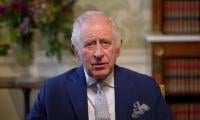Consent of masses behind military courts: COAS
DG ISPR says world must help choke terrorists’ funding; says neighbouring countries abetting terrorism in Balochistan; border violations by India distracting
By our correspondents
January 16, 2015
LONDON: Army Chief Gen Raheel Sharif said on Thursday the military courts had been established with the consent of the people of Pakistan, reports Geo News.
Addressing a dinner reception in his honour at Pakistan’s High Commission here, the general said Pakistan was in a state of war, and the government and the armed forces were determined to wipe out the terrorists as the recent [APS] incident had shown the extent to which they (the terrorists) could go.
Gen Raheel was confident that Pakistan would overcome its problems soon. He also spoke on the issue of the internally displaced persons (IDPs), stating that steps were under way for their rehabilitation. Members of the British and Pakistani community attended the reception.
Murtaza Ali Shah adds: Director General (DG) Inter-Services Public Relations (ISPR) Major General Asim Saleem Bajwa on Thursday said that Pakistan needed assistance of the world community to choke the funding of terrorists.
He said that the neighbouring countries were abetting and assisting terrorism in Balochistan as the routine border violations by India were aimed at distracting Pakistan from effectively taking on the terrorists who are under attack from the Pakistan Army on the western borders.
Speaking at the defence think-tank, the Royal United Services Institute (RUSI), here to diplomats, defence analysts and heads of think-tanks, General Bajwa spoke with clarity and conviction on all facets of Pakistan’s drive against militancy and said that the army was determined to play its role in stamping out terrorism in all forms and shapes.
General Bajwa said that Pakistan understood very well why India was resorting to violations routinely to distract its own people from what was going on inside India but also to distract Pakistan from fighting terrorists.
However, the DG ISPR said Pakistan had always shown restraint but there was a limit to it. “We have been offering peace all along to India despite the fact that India has done a lot of, they cancelled talks, they have shown arrogance in response to our overtures for peace, they have accused Pakistan wrongly without any evidence, but we know there is a method to their madness. They are trying to distract our attention through all means but we will not be distracted. We need peace and we have offered it many times.”
General Bajwa explained that Pakistan’s Foreign Office did all it could to develop peace with Indian and Prime Minister Nawaz Sharif went to a great length to offer peace to India and held talks with Indian PM Narendra Modi. “We offered DG level talks to India and it helped to some extent but what you do when there are military violations and you are wrongly blamed. That doesn’t help. We do expect everyone to play role to bring peace and things are right there for everyone to see. India needs to understand that peace is a two-way traffic. There are a lot of things happening in India and we are not oblivious to those factors. There is festering wound of unresolved issue of Kashmir. This issue remains a stumbling block in the way to peace between India and Pakistan.”
Answering a question, General Bajwa blasted the depiction of Pakistan in the Homeland series, which was recently aired and condemned widely in Pakistan for showing Pakistan as a hellhole. The DG ISPR said that the Homeland series was nothing but slanderous and insulting to Pakistan who are a great diverse nation and have rendered great sacrifices for peace and welfare of the world. An emotional General Bajwa said that he had personally lifted dead bodies of his comrades who had sacrificed their lives battling extremists. “What was shown in the Homeland has pained me personally and it has pained all of us as a nation as what was shown is not what we are. The Homeland series was a big lie because it failed to show real Pakistan, it showed Pakistan as if it were part of Afghanistan. It harmed relations between people and it (the Homeland) went out of its way to harm Pakistan and its image.”
The DG ISPR categorically stated that “there are no good Taliban. It has become a cliché in media and intelligenatia to say so but I will appeal to media to see the true perspective of issues at hand and on the ground. You need to see things in reality. There are no good Taliban and we have been saying it all along.”
General Bajwa reminded the audience that western countries were at the forefront of praising Mujahideen as freedom fighters and heroes and stated that Margaret Thatcher even visited Afghan fighters in their camps once and praised them and the US leadership also praised Taliban of that time. He called for understanding of the issues and said Pakistan looked forward to “help of its friends and not baseless and lazy accusation. “What we are faced with is a common fight. We cannot wish it away, we have to fight it together and beat it together. Terrorists have one single agenda: terrorism. They know who their enemy is and we must know that. Pulling legs of each other will help terrorists and it will not help us at all.”
The DG ISPR said that Pakistan had stopped calling Taliban as this word meant “students”. “Pakistanis address them as brutal barbarians who have no humanity in them. They stand marginalised and their narrative is excluded, their misplaced ideology has been countered. There is a political action plan against them and we are determined to defeat them.”
The DG ISPR spoke on the role of the Pakistan Army in countering terrorism, rendering great sacrifices and how Pakistan had been fighting terrorists against all odds. He explained how the army freed areas from Taliban control adding that the strategic objective was to deny them use of Pakistan’s territory to achieve lasting peace in Pakistan but also in the wider region. He said that Pakistan army started operations in various western border areas with the aim of eliminating terrorism and ending militant links in the area to establish writ of the state and to improve governance in the area, the army began its operation from the North in Bajaur Agency and made its way down.
He recalled how Swat was taken over by terrorists and how the army went in to eliminate them after the Tehrik-i-Taliban Pakistan (TTP) began flogging people meting out their brand of justice. The operation was lauded by the United Nations as the most successful operation of its kind, he said.
Bajwa shared that the government made efforts to negotiate with the terrorists to address the matter through dialogue but that didn’t help and while the talks were going on the terrorists attacked one of the country’s major airports in Karachi which was a defining point to launch Operation Zarb-e-Azb.
Prior to the launch of operation Zarb-e-Azb, Bajwa added the Army Chief issued clear instructions that the operation would be against terrorists of all hues without any discrimination with the aim of eliminating anyone who tried to challenge writ of the state. He said the army chief instructed that the collateral damage must be avoided even at the cost of delayed progress in the operation and that no human rights violations should take place.
He explained that Operation Zarb-e-Azb was not an end in itself but a national effort involving all segments of Pakistani society determined to root out terrorism from Pakistan and it was aimed at restoring the writ of the government through use of military intervention, destroying safe havens and terrorist hideouts, eliminating all kinds of terrorists.
Bajwa shared that Operation Zarb-e-Azb was continuing successfully. As a result over 2,000 terrorists had been killed in North Waziristan and elsewhere, he added that the price being paid was also high as over 200 soldiers had laid down their lives and nearly 800 had been injured. He explained that the Army had dismantled the terror economy because it’s important to choke their sources of funding to cripple them. General Bajwa said that the Taliban were using safe havens in North Waziristan to operate, they had communication systems, were manufacturing bombs and explosive material for their nefarious terror objectives.
Owing to Pakistan’s porous borders, Bajwa said the Taliban were able to cross over to Afghanistan due to their existing links. He added that ISAF and the Afghan security forces were informed well before the launch of Operation Zarb-e-Azb about the border-crossing and in some cases they met with success while in others they were still struggling.
The DG ISPR explained that the Army went into Khyber Agency to clear the area and to sever links that the terrorists were trying to reestablish, adding that they met with success due to good cooperation with the Afghan and ISAF forces.
Bajwa added when the forces went in, they discovered that the terrorists were very well equipped and would have been able to cause great damage.
Bajwa told the think tank that Pakistan had started various social economic development projects within the tribal areas to bring dividends to the locals through trade and economic development, adding that a general trade corridor had been created to expedite trade.
On the issue of Pakistan’s porous border, Bajwa explained that it was difficult to seal the western border with Afghanistan and the border with Iran adding that it was a big challenge. He said that Pakistan had a 3000km Eastern border with India and others. He shared that Pakistan’s neighbours kept hurling allegations without showing understanding of the difficult terrain.
General Bajwa said that military courts had been set up to deal with terrorists only and these courts were a “stopgap arrangement for capacity issue of our judicial system”.
“The decision to reform madaris has been taken against those who abet and facilitate terrorists or those who sympathise with terrorists. Anyone involved in terrorists activities has to be apprehended and action taken,” he said. Answering a question, General Bajwa said that warrants against Maulana Aziz had been issued and it’s a matter of execution as far he knew now. He said it showed that the government was serious about dealing with anyone who sympathised or promoted terrorism in any form.
The DG ISPR said low level insurgency in Balochistan was a national problem and it’s clear that “external interference” had been at the heart of it. He said that insurgency couldn’t have been sustained without funding, training and assistance from abroad from those who were hostile to Pakistan and played double games with Pakistan. He said it was a well-known fact that there were camps in Afganistan where Baloch militants were trained and then the porous border was used to send them in to attack Pakistani installations.
The DG ISPR said that the kind of militancy Pakistan was facing in Balochistan was the result of “foreign help” and Pakistan knew who was involved but chose not to name any country.
General Bajwa said that attack on Army Public School was a “horrendous act of terrorism which shook Pakistan”. He said that attack on schoolchildren had brought the whole nation together. He thanked the international community for standing by Pakistan in the difficult hour. General Bajwa said he saw “gory scenes first hands” when he visited the site.
“It remains difficult to absorb and understand what happened there, it was terrorism of unbelievable levels, unheard of and unethical, it was beyond imagination, it brought pain and grief to everyone in the world, the nation is united to fight terror,” said General Bajwa.
Addressing a dinner reception in his honour at Pakistan’s High Commission here, the general said Pakistan was in a state of war, and the government and the armed forces were determined to wipe out the terrorists as the recent [APS] incident had shown the extent to which they (the terrorists) could go.
Gen Raheel was confident that Pakistan would overcome its problems soon. He also spoke on the issue of the internally displaced persons (IDPs), stating that steps were under way for their rehabilitation. Members of the British and Pakistani community attended the reception.
Murtaza Ali Shah adds: Director General (DG) Inter-Services Public Relations (ISPR) Major General Asim Saleem Bajwa on Thursday said that Pakistan needed assistance of the world community to choke the funding of terrorists.
He said that the neighbouring countries were abetting and assisting terrorism in Balochistan as the routine border violations by India were aimed at distracting Pakistan from effectively taking on the terrorists who are under attack from the Pakistan Army on the western borders.
Speaking at the defence think-tank, the Royal United Services Institute (RUSI), here to diplomats, defence analysts and heads of think-tanks, General Bajwa spoke with clarity and conviction on all facets of Pakistan’s drive against militancy and said that the army was determined to play its role in stamping out terrorism in all forms and shapes.
General Bajwa said that Pakistan understood very well why India was resorting to violations routinely to distract its own people from what was going on inside India but also to distract Pakistan from fighting terrorists.
However, the DG ISPR said Pakistan had always shown restraint but there was a limit to it. “We have been offering peace all along to India despite the fact that India has done a lot of, they cancelled talks, they have shown arrogance in response to our overtures for peace, they have accused Pakistan wrongly without any evidence, but we know there is a method to their madness. They are trying to distract our attention through all means but we will not be distracted. We need peace and we have offered it many times.”
General Bajwa explained that Pakistan’s Foreign Office did all it could to develop peace with Indian and Prime Minister Nawaz Sharif went to a great length to offer peace to India and held talks with Indian PM Narendra Modi. “We offered DG level talks to India and it helped to some extent but what you do when there are military violations and you are wrongly blamed. That doesn’t help. We do expect everyone to play role to bring peace and things are right there for everyone to see. India needs to understand that peace is a two-way traffic. There are a lot of things happening in India and we are not oblivious to those factors. There is festering wound of unresolved issue of Kashmir. This issue remains a stumbling block in the way to peace between India and Pakistan.”
Answering a question, General Bajwa blasted the depiction of Pakistan in the Homeland series, which was recently aired and condemned widely in Pakistan for showing Pakistan as a hellhole. The DG ISPR said that the Homeland series was nothing but slanderous and insulting to Pakistan who are a great diverse nation and have rendered great sacrifices for peace and welfare of the world. An emotional General Bajwa said that he had personally lifted dead bodies of his comrades who had sacrificed their lives battling extremists. “What was shown in the Homeland has pained me personally and it has pained all of us as a nation as what was shown is not what we are. The Homeland series was a big lie because it failed to show real Pakistan, it showed Pakistan as if it were part of Afghanistan. It harmed relations between people and it (the Homeland) went out of its way to harm Pakistan and its image.”
The DG ISPR categorically stated that “there are no good Taliban. It has become a cliché in media and intelligenatia to say so but I will appeal to media to see the true perspective of issues at hand and on the ground. You need to see things in reality. There are no good Taliban and we have been saying it all along.”
General Bajwa reminded the audience that western countries were at the forefront of praising Mujahideen as freedom fighters and heroes and stated that Margaret Thatcher even visited Afghan fighters in their camps once and praised them and the US leadership also praised Taliban of that time. He called for understanding of the issues and said Pakistan looked forward to “help of its friends and not baseless and lazy accusation. “What we are faced with is a common fight. We cannot wish it away, we have to fight it together and beat it together. Terrorists have one single agenda: terrorism. They know who their enemy is and we must know that. Pulling legs of each other will help terrorists and it will not help us at all.”
The DG ISPR said that Pakistan had stopped calling Taliban as this word meant “students”. “Pakistanis address them as brutal barbarians who have no humanity in them. They stand marginalised and their narrative is excluded, their misplaced ideology has been countered. There is a political action plan against them and we are determined to defeat them.”
The DG ISPR spoke on the role of the Pakistan Army in countering terrorism, rendering great sacrifices and how Pakistan had been fighting terrorists against all odds. He explained how the army freed areas from Taliban control adding that the strategic objective was to deny them use of Pakistan’s territory to achieve lasting peace in Pakistan but also in the wider region. He said that Pakistan army started operations in various western border areas with the aim of eliminating terrorism and ending militant links in the area to establish writ of the state and to improve governance in the area, the army began its operation from the North in Bajaur Agency and made its way down.
He recalled how Swat was taken over by terrorists and how the army went in to eliminate them after the Tehrik-i-Taliban Pakistan (TTP) began flogging people meting out their brand of justice. The operation was lauded by the United Nations as the most successful operation of its kind, he said.
Bajwa shared that the government made efforts to negotiate with the terrorists to address the matter through dialogue but that didn’t help and while the talks were going on the terrorists attacked one of the country’s major airports in Karachi which was a defining point to launch Operation Zarb-e-Azb.
Prior to the launch of operation Zarb-e-Azb, Bajwa added the Army Chief issued clear instructions that the operation would be against terrorists of all hues without any discrimination with the aim of eliminating anyone who tried to challenge writ of the state. He said the army chief instructed that the collateral damage must be avoided even at the cost of delayed progress in the operation and that no human rights violations should take place.
He explained that Operation Zarb-e-Azb was not an end in itself but a national effort involving all segments of Pakistani society determined to root out terrorism from Pakistan and it was aimed at restoring the writ of the government through use of military intervention, destroying safe havens and terrorist hideouts, eliminating all kinds of terrorists.
Bajwa shared that Operation Zarb-e-Azb was continuing successfully. As a result over 2,000 terrorists had been killed in North Waziristan and elsewhere, he added that the price being paid was also high as over 200 soldiers had laid down their lives and nearly 800 had been injured. He explained that the Army had dismantled the terror economy because it’s important to choke their sources of funding to cripple them. General Bajwa said that the Taliban were using safe havens in North Waziristan to operate, they had communication systems, were manufacturing bombs and explosive material for their nefarious terror objectives.
Owing to Pakistan’s porous borders, Bajwa said the Taliban were able to cross over to Afghanistan due to their existing links. He added that ISAF and the Afghan security forces were informed well before the launch of Operation Zarb-e-Azb about the border-crossing and in some cases they met with success while in others they were still struggling.
The DG ISPR explained that the Army went into Khyber Agency to clear the area and to sever links that the terrorists were trying to reestablish, adding that they met with success due to good cooperation with the Afghan and ISAF forces.
Bajwa added when the forces went in, they discovered that the terrorists were very well equipped and would have been able to cause great damage.
Bajwa told the think tank that Pakistan had started various social economic development projects within the tribal areas to bring dividends to the locals through trade and economic development, adding that a general trade corridor had been created to expedite trade.
On the issue of Pakistan’s porous border, Bajwa explained that it was difficult to seal the western border with Afghanistan and the border with Iran adding that it was a big challenge. He said that Pakistan had a 3000km Eastern border with India and others. He shared that Pakistan’s neighbours kept hurling allegations without showing understanding of the difficult terrain.
General Bajwa said that military courts had been set up to deal with terrorists only and these courts were a “stopgap arrangement for capacity issue of our judicial system”.
“The decision to reform madaris has been taken against those who abet and facilitate terrorists or those who sympathise with terrorists. Anyone involved in terrorists activities has to be apprehended and action taken,” he said. Answering a question, General Bajwa said that warrants against Maulana Aziz had been issued and it’s a matter of execution as far he knew now. He said it showed that the government was serious about dealing with anyone who sympathised or promoted terrorism in any form.
The DG ISPR said low level insurgency in Balochistan was a national problem and it’s clear that “external interference” had been at the heart of it. He said that insurgency couldn’t have been sustained without funding, training and assistance from abroad from those who were hostile to Pakistan and played double games with Pakistan. He said it was a well-known fact that there were camps in Afganistan where Baloch militants were trained and then the porous border was used to send them in to attack Pakistani installations.
The DG ISPR said that the kind of militancy Pakistan was facing in Balochistan was the result of “foreign help” and Pakistan knew who was involved but chose not to name any country.
General Bajwa said that attack on Army Public School was a “horrendous act of terrorism which shook Pakistan”. He said that attack on schoolchildren had brought the whole nation together. He thanked the international community for standing by Pakistan in the difficult hour. General Bajwa said he saw “gory scenes first hands” when he visited the site.
“It remains difficult to absorb and understand what happened there, it was terrorism of unbelievable levels, unheard of and unethical, it was beyond imagination, it brought pain and grief to everyone in the world, the nation is united to fight terror,” said General Bajwa.
-
 Jenny Slate Reflects On The Impact Romance Has On Her Life
Jenny Slate Reflects On The Impact Romance Has On Her Life -
 Why Princess Diana Kept Her Sickness Under Wraps? Expert Reveals
Why Princess Diana Kept Her Sickness Under Wraps? Expert Reveals -
 Gabrielle Union Gets Real About Menopause Shame: 'I Felt Very Isolated'
Gabrielle Union Gets Real About Menopause Shame: 'I Felt Very Isolated' -
 Tyra Banks Addresses America’s Next Top Model Backlash In New Netflix Docuseries Trailer
Tyra Banks Addresses America’s Next Top Model Backlash In New Netflix Docuseries Trailer -
 Kim Kardashian Admits She 'lived' For Fame As She Spills Hilarious Paparazzi Prank
Kim Kardashian Admits She 'lived' For Fame As She Spills Hilarious Paparazzi Prank -
 Prince Harry’s Life After Megxit & Residual Fallout Comes To Light As He Fails To Even Leave The House
Prince Harry’s Life After Megxit & Residual Fallout Comes To Light As He Fails To Even Leave The House -
 Victoria Beckham Celebrates Major Win After Brooklyn Bombshell Claims: 'Grateful'
Victoria Beckham Celebrates Major Win After Brooklyn Bombshell Claims: 'Grateful' -
 Zara Tindall Feels 'very Lucky' She Has No Royal Duties
Zara Tindall Feels 'very Lucky' She Has No Royal Duties -
 Kelly Clarkson's Talk Show Future Revealed After Shutdown Rumors
Kelly Clarkson's Talk Show Future Revealed After Shutdown Rumors -
 Meghan Markle, Prince Harry Are Finally Feeling Hollywood’s Ruthlessness: ‘It’s A Very Bitter Blow’
Meghan Markle, Prince Harry Are Finally Feeling Hollywood’s Ruthlessness: ‘It’s A Very Bitter Blow’ -
 Amelia Gray Details Emergency Surgery And Full Cosmetic History
Amelia Gray Details Emergency Surgery And Full Cosmetic History -
 Why Princess Diana Never Enjoyed Balmoral Holidays With Family
Why Princess Diana Never Enjoyed Balmoral Holidays With Family -
 Bella Hadid's Texas Love Story With Adan Banuelos Comes To An End
Bella Hadid's Texas Love Story With Adan Banuelos Comes To An End -
 Ex-Prince Andrew, Sarah Ferguson’s Breakdown Forces Her To Unchartered Waters: It’s Horrifying’
Ex-Prince Andrew, Sarah Ferguson’s Breakdown Forces Her To Unchartered Waters: It’s Horrifying’ -
 Kate Winslet Confesses She 'went Mad' After Playing Intense TV Gig
Kate Winslet Confesses She 'went Mad' After Playing Intense TV Gig -
 King Charles 'simple' Breakfast Routine That Keeps Chefs On Toes
King Charles 'simple' Breakfast Routine That Keeps Chefs On Toes



